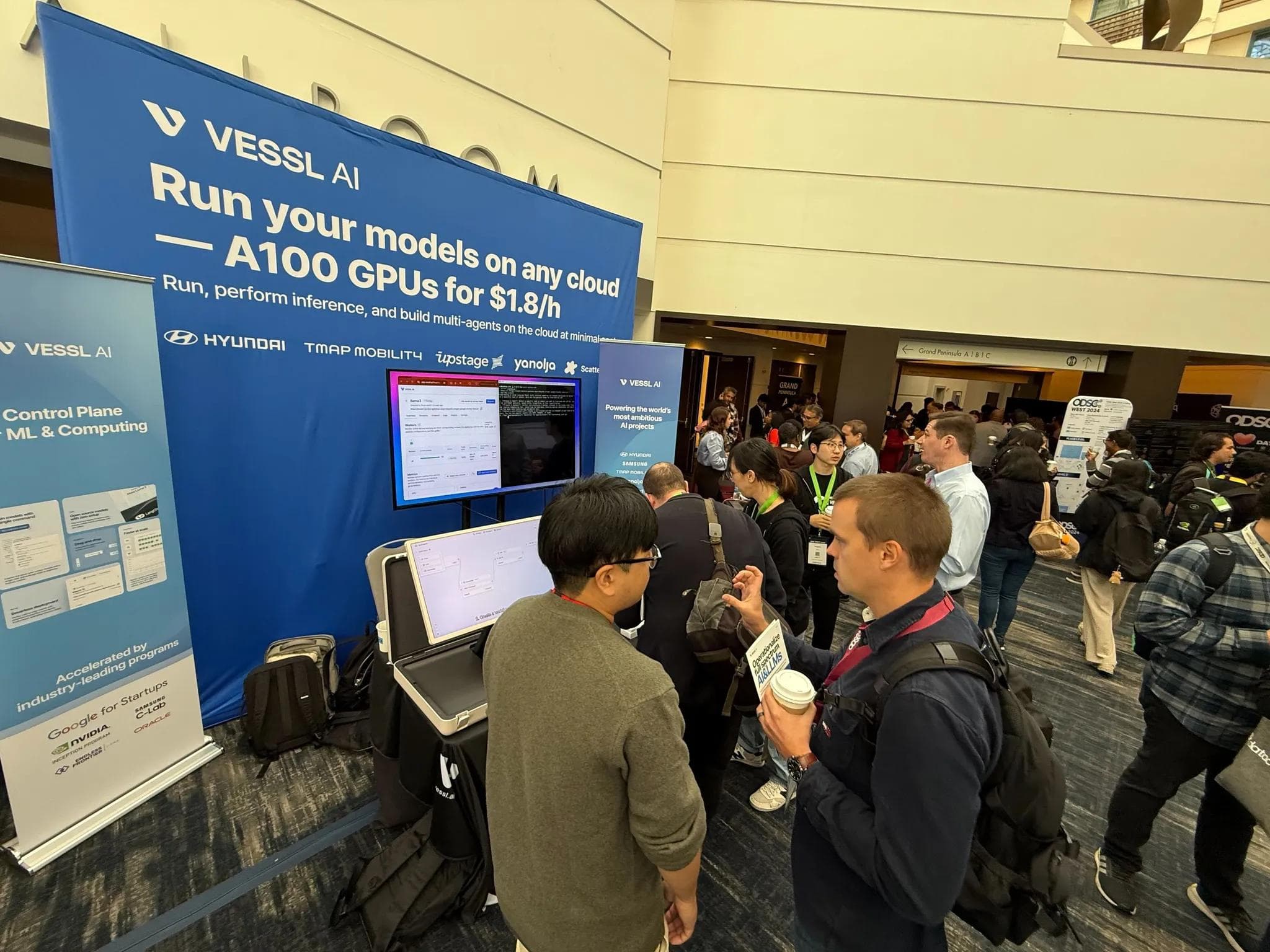Community
20 November 2024
VESSL AI's ODSC 2024 Review
At ODSC 2024, VESSL showcased its MLOps platform, gaining industry attention for unified hybrid infrastructure and cost-effective LLM solutions.

San Mateo, CA – October 29-31, 2024 – ODSC 2024 was marked by strong participation from AI-related startups and enterprises, with vibrant discussions around the latest technological trends and innovative solutions. As a Gold Sponsor, VESSL AI showcased its end-to-end MLOps platform, which supports users in executing ML tasks seamlessly across diverse infrastructure environments. As a platform, VESSL is particularly powerful in its ability to unify both cloud and on-premises environments into a single managed cluster. Furthermore, VESSL has also introduced RAG and Agentic Workflow technologies to enable non-developers to build chatbots with ease.
At this event, VESSL AI connected with numerous enterprises utilizing AI and LLM. Many were working across multiple cloud environments and were actively seeking a solution to unify these management processes. VESSL’s cluster management feature garnered significant attention for its potential to resolve this issue. Additionally, VESSL highlighted its competitive on-demand rate of $1.8 per hour for A100 GPUs, which was met with enthusiasm from attendees.
Talk Highlights
Throughout the conference, we gathered essential insights from multiple sessions to capture the most impactful moments of ODSC 2024.
How VESSL AI Enables 100+ LLM Deployments for $10 and Saves $1M Annually

Jaeman An, CEO of VESSL AI, presented at ODSC West 2024 on strategies to reduce costs and address performance, security, and compliance challenges in large-scale Large Language Model (LLM) deployments using VESSL. He highlighted the platform's ability to deploy over 100 LLMs starting at just $10, significantly reducing initial setup costs. An also discussed how optimizing GPU resource allocation and implementing hybrid-cloud strategies can lead to substantial cloud cost savings, with organizations potentially saving over $1 million annually. VESSL AI's automated scaling and monitoring features ensure efficient resource utilization and maintain high-performance AI services. Additionally, VESSL AI's seamless integration with open-source tools like Hugging Face Inference API, LangChain, Kubernetes, and vLLM streamlines the development and deployment process.
Key Takeaways
- Cost-Efficient LLM Deployment: VESSL AI's platform facilitates the deployment of over 100 LLMs starting at just $10, significantly reducing initial setup costs.
- Substantial Cloud Cost Savings: By optimizing GPU resource allocation and implementing hybrid-cloud strategies, organizations can save over $1 million annually in cloud expenses.
- Automated Scaling and Monitoring: The platform offers automated scaling and monitoring capabilities, ensuring efficient resource utilization and maintaining high-performance AI services.
- Integration with Open-Source Tools: VESSL AI seamlessly integrates with tools like Hugging Face Inference API, LangChain, Kubernetes, and vLLM, streamlining the development and deployment process.
- Real-World Applications Across Industries: The platform's effectiveness is demonstrated through use cases in finance, healthcare, and e-commerce, showcasing its versatility and impact across various sectors.
Advanced RAG Architectures: Beyond Basic Document Retrieval

A key theme at ODSC was the advancement of Retrieval-Augmented Generation (RAG) technologies. Bill DeWeese focused on essential RAG components, such as embedding and search, highlighting a significant industry shift toward hybrid search. This approach combines BM25 keyword search with Sparse and Dense models, providing improved accuracy and relevance, and is quickly becoming a new standard in RAG architectures.
Key Takeaways
- Multi-vector retrieval strategies: Implementing these strategies can improve accuracy by capturing diverse aspects of data.
- Dynamic context window management: Effectively handling complex queries through optimized context windows enhances system performance.
- Recursive retrieval patterns: Utilizing these patterns can enhance reasoning capabilities within RAG systems.
- Hybrid search approaches: Combining dense and sparse embeddings leads to more effective search results.
- Query rewriting and decomposition techniques: These methods refine queries for better retrieval outcomes.
Simulating Ourselves and Our Societies With Generative Agents

Joon Park, a professor at Stanford University introduced "Generative Agents," exploring how NPCs with human-like interactions could simulate complex social behaviors. These agents offer a fresh approach to traditional A/B testing, enabling researchers to run intricate simulations that reflect real-world dynamics. By modeling social interactions and responses, Generative Agents provide a valuable tool for exploring problem-solving scenarios and understanding human-like decision-making in controlled environments.
Key Takeaways
- Architecture of Generative Agents: Understanding the framework that enables agents to store experiences, synthesize memories, and retrieve information dynamically to plan behaviors.
- Believable Human Simulation: Techniques for creating agents that perform daily activities, form opinions, and engage in social interactions, thereby exhibiting realistic human-like behaviors.
- Emergent Social Dynamics: Insights into how individual agent behaviors can lead to complex social phenomena, such as the organization of events and the formation of relationships within simulated environments.
- Applications in Interactive Systems: Exploration of how generative agents can enhance interactive applications, including immersive environments, communication training platforms, and prototyping tools.
- Evaluation of Agent Behavior: Methods for assessing the believability and effectiveness of agent behaviors, emphasizing the importance of observation, planning, and reflection components in the agent architecture.
Large Model Quality and Evaluation

Evaluating LLMs was another significant topic at the event. Unlike traditional AI models, LLMs require various roles, which calls for diverse evaluation methods. Anoop Sinha, Research Director of AI&Future Technologies at Google, outlined the challenges in LLM evaluation and shared insights on approaching it from perspectives such as human input, functional testing, and user feedback. His detailed explanation of evaluation methodologies, particularly in cycles where human feedback is incorporated in the training process of LLMs, was especially memorable.
Key Takeaways
- Comprehensive Evaluation Metrics: It's essential to employ a variety of metrics to assess LLMs effectively. This includes traditional measures like perplexity and BLEU scores, as well as human evaluations to capture nuances in language understanding and generation.
- Task-Specific Benchmarks: Utilizing datasets tailored to specific applications, such as question-answering or summarization, enables precise assessment of an LLM's capabilities in targeted areas.
- Addressing Bias and Fairness: Implementing evaluation frameworks that detect and mitigate biases ensures that LLMs produce equitable and unbiased outputs, fostering trust and ethical AI deployment.
- Human-in-the-Loop Evaluation: Incorporating human judgment in the evaluation process helps capture nuances that automated metrics might overlook, leading to more accurate assessments of language quality and relevance.
- Continuous Monitoring and Adaptation: Regularly updating evaluation protocols to keep pace with advancements in LLMs is crucial for maintaining robust assessments and ensuring models meet evolving standards and user expectations.
Building Reliable Coding Agents

As agents continue to advance, they are increasingly capable in the coding domain. However, creating a reliable coding agent, especially when handling code rather than text, presents unique challenges. Eno Reyes, CTO of Factory.co, presented on how they build reliable coding agents, explaining methodologies in planning, decision making, and environmental grounding. His in-depth discussion on the strengths and weaknesses of each approach provided considerable inspiration.
Key Takeaways
- Inspiration from Diverse Fields: Drawing insights from robotics, cybernetics, and biology can inform the creation of agentic systems that are more reliable than the sum of their individual stochastic components.
- Understanding Non-Deterministic Decision-Making: Recognizing the inherent unpredictability in agentic systems is crucial for developing strategies to manage and mitigate potential uncertainties.
- Implementing STOTA Techniques: Utilizing STOTA (Systematic Testing of Agentic Techniques and Architectures) methods can enhance the reliability and robustness of coding agents.
- Designing for Reliability: Emphasizing the importance of architectural design choices that prioritize system reliability, including redundancy, fault tolerance, and adaptive learning mechanisms.
- Continuous Learning and Adaptation: Ensuring that coding agents are capable of learning from their environment and experiences to improve performance and reliability over time.
Closing Thoughts
ODSC 2024 highlighted the transformative power of AI and machine learning across diverse fields, with speakers underscoring how these technologies are reshaping industries. Key discussions focused not only on enhancing efficiency but also on enabling groundbreaking applications, from advanced RAG architectures and generative agents to reliable coding systems. This year’s conference reflected the AI community’s commitment to innovation, collaboration, and real-world impact.
Our participation at ODSC 2024 has reinforced our dedication to advancing the fields of AI and MLOps. We are inspired to continue pioneering new solutions that address today’s challenges and create meaningful, scalable impacts. The insights and connections gained at this event will fuel our commitment to pushing the boundaries of what AI can achieve, fostering partnerships that drive us all toward a more intelligent and connected future.

Lucas
Software Engineer

Seokju Hong
Software Engineer

Wayne Kim
Technical Communicator
Try VESSL today
Build, train, and deploy models faster at scale with fully managed infrastructure, tools, and workflows.